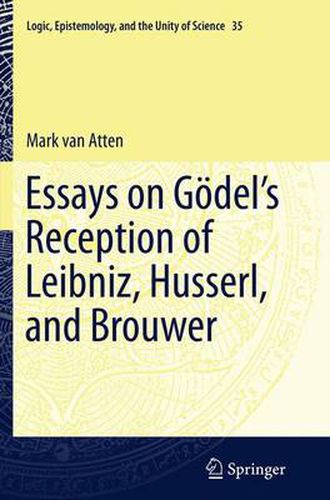Readings Newsletter
Become a Readings Member to make your shopping experience even easier.
Sign in or sign up for free!
You’re not far away from qualifying for FREE standard shipping within Australia
You’ve qualified for FREE standard shipping within Australia
The cart is loading…






This title is printed to order. This book may have been self-published. If so, we cannot guarantee the quality of the content. In the main most books will have gone through the editing process however some may not. We therefore suggest that you be aware of this before ordering this book. If in doubt check either the author or publisher’s details as we are unable to accept any returns unless they are faulty. Please contact us if you have any questions.
This volume tackles Goedel’s two-stage project of first using Husserl’s transcendental phenomenology to reconstruct and develop Leibniz’ monadology, and then founding classical mathematics on the metaphysics thus obtained. The author analyses the historical and systematic aspects of that project, and then evaluates it, with an emphasis on the second stage.
The book is organised around Goedel’s use of Leibniz, Husserl and Brouwer. Far from considering past philosophers irrelevant to actual systematic concerns, Goedel embraced the use of historical authors to frame his own philosophical perspective. The philosophies of Leibniz and Husserl define his project, while Brouwer’s intuitionism is its principal foil: the close affinities between phenomenology and intuitionism set the bar for Goedel’s attempt to go far beyond intuitionism.
The four central essays are “Monads and sets’, "On the philosophical development of Kurt Goedel’, "Goedel and intuitionism’, and "Construction and constitution in mathematics’. The first analyses and criticises Goedel’s attempt to justify, by an argument from analogy with the monadology, the reflection principle in set theory. It also provides further support for Goedel’s idea that the monadology needs to be reconstructed phenomenologically, by showing that the unsupplemented monadology is not able to found mathematics directly. The second studies Goedel’s reading of Husserl, its relation to Leibniz’ monadology, and its influence on his publishe
d writings. The third discusses how on various occasions Brouwer’s intuitionism actually inspired Goedel’s work, in particular the Dialectica Interpretation. The fourth addresses the question whether classical mathematics admits of the phenomenological foundation that Goedel envisaged, and concludes that it does not.
The remaining essays provide further context. The essays collected here were written and published over the last decade. Notes have been added to record further thoughts, changes of mind, connections between the essays, and updates of references.
$9.00 standard shipping within Australia
FREE standard shipping within Australia for orders over $100.00
Express & International shipping calculated at checkout
This title is printed to order. This book may have been self-published. If so, we cannot guarantee the quality of the content. In the main most books will have gone through the editing process however some may not. We therefore suggest that you be aware of this before ordering this book. If in doubt check either the author or publisher’s details as we are unable to accept any returns unless they are faulty. Please contact us if you have any questions.
This volume tackles Goedel’s two-stage project of first using Husserl’s transcendental phenomenology to reconstruct and develop Leibniz’ monadology, and then founding classical mathematics on the metaphysics thus obtained. The author analyses the historical and systematic aspects of that project, and then evaluates it, with an emphasis on the second stage.
The book is organised around Goedel’s use of Leibniz, Husserl and Brouwer. Far from considering past philosophers irrelevant to actual systematic concerns, Goedel embraced the use of historical authors to frame his own philosophical perspective. The philosophies of Leibniz and Husserl define his project, while Brouwer’s intuitionism is its principal foil: the close affinities between phenomenology and intuitionism set the bar for Goedel’s attempt to go far beyond intuitionism.
The four central essays are “Monads and sets’, "On the philosophical development of Kurt Goedel’, "Goedel and intuitionism’, and "Construction and constitution in mathematics’. The first analyses and criticises Goedel’s attempt to justify, by an argument from analogy with the monadology, the reflection principle in set theory. It also provides further support for Goedel’s idea that the monadology needs to be reconstructed phenomenologically, by showing that the unsupplemented monadology is not able to found mathematics directly. The second studies Goedel’s reading of Husserl, its relation to Leibniz’ monadology, and its influence on his publishe
d writings. The third discusses how on various occasions Brouwer’s intuitionism actually inspired Goedel’s work, in particular the Dialectica Interpretation. The fourth addresses the question whether classical mathematics admits of the phenomenological foundation that Goedel envisaged, and concludes that it does not.
The remaining essays provide further context. The essays collected here were written and published over the last decade. Notes have been added to record further thoughts, changes of mind, connections between the essays, and updates of references.